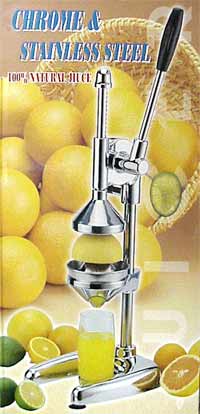Juicing

Many drink recipes call for fruit juice. While some might find that adding bottled or canned fruit juice works just fine, others swear that using fresh fruit juice makes all the difference between an ok drink and one that is outstanding.
You probably think that juicing fruits is a bit of a hassle. And, sure, it does take a little more time that opening a bottle or popping the top of a can. But, once you get the hang of it, you'll realize that it isn't as hard as you thought, and that the benefits are amazing.
Before you can even think about squeezing your own juice, you need to invest in a juicer. There are several types to choose from. One of the most basic juicers is the manual press variety. This type of juicer is maneuvered by hand and is ideal for soft fruits. A centrifugal juicer shreds or grates the fruits and then spins it to release the juice. The last type of a masticating juicer. As the name suggests, a masticating juicer basically chews the fruit in order to break down its cell walls to create a high fiber juice.
Once you have selected the juicer of your choice, now you need the fruit. Be aware that you will need a fairly large amount of fruit if you want even a glass of fresh juice.
Fruits such as avocado, bananas and strawberries aren't the ideal fruits for juicing, although they do work well for blending in extra flavors. These types of fruits contain small amounts of water, so they won't yield much liquid.
When looking for an ideal fruit for juicing, you want to make sure that you choose those that contain large amounts of water. Grapes, pears, apples, peaches, grapefruit, oranges, watermelon, and cantaloupe are all fruits that will juice well and taste great. Softer fruits, such as pears and peaches will produce a thicker juice, often referred to as nectar, and some will even yield a juice that is thick. As a rule of thumb, remember that the softer a certain type of fruit is the thicker its created juice will be.
Once you have run your preferred fruit through your juicer, you may notice that it has a large amount of pulp in it. Some people prefer their juice to have contain this pulp, but others may not like their drink to contain any sort of chunks. If you are among the latter, you can remove the pulp by straining the juiced liquid through a coffee filter or cheesecloth.
Now that you know how about juicers and how to select fruits, you should also learn just how much freshly squeezed juice can benefit your health. Not only can you get your daily allowance of fruits, and often vegetables if you decide to juice them and add them to your drink, you can also add the enzymes and nutrients that you need to your diet. You will also consume a great amount of fiber that can help you to control how quickly your bloodstream absorbs sugar.
Next time you see a recipe that requires fruit juice, or you just have a hankering for a nice tall glass of your favorite juice, don't take the easy route and turn to manufactured products. Juice your own and know that you are getting exactly the taste you want, as well as the healthy benefits your body deserves.